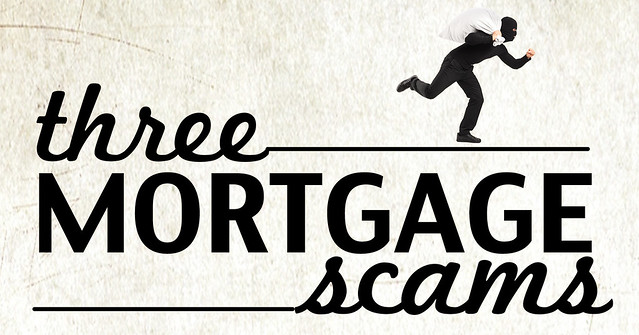Buying a home has so many caveats and limitations that it may be hard to find a dream home. It's especially hard for individuals who aren't able to pay for a home in cash and don't qualify for a mortgage loan from a lender. These individuals sometimes can get trapped in home mortgage scams where they lose money and their new home. Landmark outlines three possible mortgage scams and how to avoid them.
Lease to Own
A lease to own mortgage is usually something offered by the seller when an interested buyer doesn't qualify for a loan to pay for the home up front. Instead, the seller becomes a landlord for a time and charges rent to the homeowners, until they can build up their credit and qualify for a mortgage. Often times the seller charges "opt-in" money at the start of a lease to own agreement, which shows the buyers intent to purchase the home after qualifying.
Many times a lease-to-own mortgage seems like a great deal.The buyer pays "rental" payments until they can buy the home outright. However, these rental payments are usually overpriced. Worse than that is when the contract states it's time for the buyer to purchase the home outright, and they still cannot qualify for a home loan. The seller can then kick them out of the home and keep all of the rental payments and opt-in money.
If you don't qualify for a mortgage, talk to your local Approved Housing Counseling Agencies. Some can find mortgages for low credit or low-income individuals. With this lower rate, homeowners can purchase home warranty insurance and save money by protecting their systems and appliances. Home warranty insurance could also be included in a home sale.
Wraparound Mortgages
For individuals who cannot qualify for a home loan, a scamming seller will provide a mortgage instead of a traditional lender. This "mortgage" wraps around the mortgage the seller has on the home already. When the buyer pays money to the seller, the seller pays it on their mortgage to the bank.
Some sellers in this situation scam the buyer. If the seller doesn't make payments to the bank, the home will be foreclosed and the buyer is kicked out. Or, if the seller wants to make money, they'll charge more from the buyer on the mortgage payment, pay their minimum to the bank, and pocket the rest.
The best way to combat this mortgage scam is to make sure there is a written contract between the seller and the buyer of the home. Then, a real estate agent hired by the buyer should properly vet the contract. If there are loopholes in the contract, the buyer should look for another home "“ preferably one covered by home warranty insurance. If the home doesn't have home warranty insurance, it may be hard to buy a home, as home warranty insurance can save a homeowner hundreds of dollars a year.
Bond or Contract for Deed
When a seller enters into a Contract for Deed agreement, the buyer is entering into another type of "rent-to-own" arrangement. Instead of agreeing to have rental payments until the individual is qualified for a loan, a seller will let the buyer pay rent until they pay the seller for the home in full. Although this may seem like a wonderful idea at first, most of the time this payment and contract will last for 10 to 20 years, depending on how much the home is worth. If the buyer happens to miss a rental payment, the seller can evict the buyer and not give them any of their money back from their rental payments.
Instead of entering into a contract for deed agreement, a buyer should go to home buying counseling to see what options there are to fully pay for a home and use a trusted lender (like a bank) to finance their home. From there, a buyer could protect their purchase with home warranty insurance. Protecting a new homeowner's budget is exactly what home warranty insurance does.
Home warranty insurance is beneficial for a new homebuyer, especially one who may not have enough money to outright pay for broken down appliances. With home warranty insurance, a homeowner pays $60 for the repair or replacement of a home's system or appliance that failed from normal wear and tear. For more information on home warranty insurance, go to www.landmarkhw.com.




